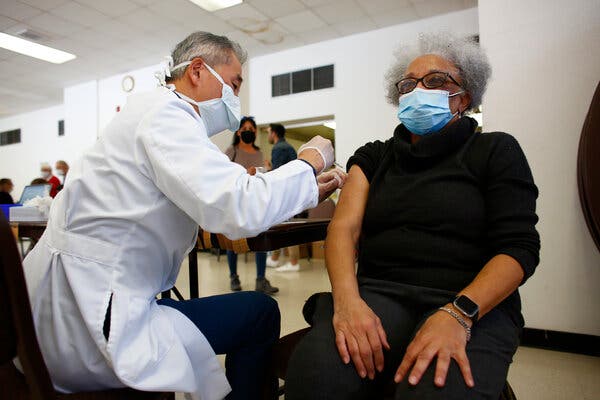
The Biden administration moved on multiple fronts Wednesday to fight back against the surging Delta variant of the coronavirus, strongly recommending booster shots for most vaccinated Americans and using federal leverage to force nursing homes to vaccinate their staffs.
The Department of Education, following a directive from President Biden to use its full power to ensure a safe-return to in-person learning, will deploy its civil rights division to deter states from banning universal masking in classrooms. That move is destined to escalate a fight with Republican governors who are blocking local school districts from requiring masks to protect against the virus.
The dramatic shifts in strategy reflect the administration’s concerns that the Delta variant is erasing its hard-fought progress against the pandemic and thrusting the nation back to the point it was soon early in the year.
Thus far, Mr. Biden has been reluctant to use the federal government’s power to withhold federal funding or intervene on school policies in order to order protective measures or force more vaccinations. But with hospitals are facing a huge new influx of Covid patients and infections are up across the country just as the school year is about to start, the administration is clearly seeking more tools to fight the pandemic.
The new booster strategy entailed a recommendation to Americans who received the Pfizer-BioNTech and Moderna coronavirus vaccines eight months after receiving their second doses, starting Sept. 20.
Administration officials made clear that booster shots will depend upon a determination by the Food and Drug Administration that third shots are safe and effective — a ruling expected in the coming weeks. And they offered reassurance that the vaccines continue to protect against severe disease and hospitalization.
Mr. Biden also announced that he is ordering up new federal regulations that will make employee vaccination a condition for nursing homes to get Medicare and Medicaid funds, according to an administration official.
The president has been reluctant until now to threaten to withhold federal funds in an effort to force vaccinations. The decision was reported earlier by CNN
One Wednesday afternoon, the president said his administration had been planning for the possibility of booster shots for months. The extra shots “will make you safer for longer” he said.
“The best way to protect ourselves from new variants that could arise plan is for every, every adult to get a booster shot,” he said adding that everyone is not vaccinated yet should go get their shots quickly.
Senior federal officials said that the booster strategy stems from new data showing that vaccine efficacy against infection and mild disease wanes over time. They voiced concern that the vaccines’ protection against serious disease could also decrease in coming months.
“Here’s what you need to know: If you are fully vaccinated, you still have a high degree of protection from the worst outcomes of Covid-19 — severe disease, hospitalization and death,” Dr. Vivek Murthy, the surgeon general, said. “We are not recommending that you go out and get a booster today.”
The officials said data from a number of sources, including from the Israeli government, indicates that people will need a boost to their immunity starting this fall. Dr. Murthy said “there’s nothing magical” about the eight month timeline for allowing boosters, but said that was the best judgment of health experts.
Moderna and Pfizer-BioNTech plan to finish submitting their data on third shots in the next few weeks. Dr. Murthy said the government is announcing its strategy now because “you can’t turn on a booster effort, you know, with the flip of a switch.” He also said the government wanted to keep Americans up to date on what the latest data on vaccine effectiveness shows.
First in line for extra shots will be health care workers, nursing home residents and other older adults, followed by the rest of the general population. Mr. Biden said the shots will be limited to adults.
Officials said the shots are needed because of dual trends: the growing evidence that the vaccines’ protection against virus infection fades over time, combined with the particular force of the Delta variant.
Dr. Rochelle Walensky, director of the Centers for Disease Control and Prevention, cited one study that suggests that vaccine efficacy against the Delta variant decreased regardless of when people were inoculated. That suggests that the vaccines might work less well against Delta variant than against its predecessors, she said.
But she added that the latest data “confirm that while protection against infection may decrease over time, protection against severe disease and hospitalization is currently holding up pretty well.”
Dr. Anthony S. Fauci, an infectious disease expert at the National Institutes of Health, said studies show that third shots of the Moderna and Pfizer vaccines can boost the levels of antibodies that fight the virus ten-fold, a “dramatic” increase. “You don’t want to find yourself behind playing catch up,” he said of the virus. “Better stay ahead of it than chasing after it.”
People who received the Johnson & Johnson vaccine may also require additional doses. But Johnson & Johnson’s vaccine was not rolled out until March, and a plan to provide boosters for those individuals will be made after reviewing new data expected over next few weeks, officials said. Only about 14 million Americans received the Johnson & Johnson vaccine, compared to about 150 million who have been fully vaccinated with either the Pfizer or Moderna vaccines.
Among other data, Dr. Walensky cited three studies, which the C.D.C. released on Wednesday, as evidence that booster shots of the two mRNA vaccines would be needed in the coming months.
One analyzed the effectiveness of vaccines among residents of nearly 4,000 nursing homes before the Delta variant’s U.S. emergence, and nearly 15,000 nursing homes when the variant dominated new infections in the country.
The vaccines’ effectiveness at preventing infections dropped from about 75 percent to 53 percent between those dates, the study found. It did not evaluate the vaccines’ protection against severe illness.
Some experts immediately pushed back against the booster strategy, saying only some older adults and people with weakened immune systems needed extra protection. Last week federal regulators cleared an additional dose for certain people with weakened immune systems who had already received the two-dose vaccines made by Pfizer-BioNTech or Moderna.
“These data support giving additional doses of vaccine to highly immunocompromised persons and nursing home residents, not to the general public,” said Dr. Celine Gounder, an infectious disease specialist at Bellevue Hospital Center and a former adviser on the pandemic to the administration.
Boosters would only be warranted if the vaccines were failing to prevent people from ending up hospitalized with Covid-19, she said.
The World Health Organization has asked that wealthy countries defer distributing booster shots until the end of September, and reiterated earlier on Wednesday that they thought third shots for populations beyond a relatively small number of people with weakened immune systems were premature, and an ineffective use of the limited pool of available vaccines.
Dr. Tedros Adhanom Ghebreyesus, the director general of the W.H.O., said at a news conference before the White House’s briefing that the organization had brought together 2,000 experts from around the world to weigh the available data on boosters. The consensus was that protecting the unvaccinated before administering booster shots was critical, he said. He did praise the United States for donating many doses and encouraged other countries to follow the country’s example.
“Vaccine injustice is a shame on all humanity and if we don’t tackle it together, we will prolong the acute stage of this pandemic for years when it could be over in a matter of months,” he said.
Dr. Michael Ryan, the executive director of the W.H.O.’s health emergencies program, said booster programs at this point amounted to handing out “extra life jackets to people who already have life jackets, while we’re leaving other people to drown without a single life jacket.”
Jeff Zients, the White House pandemic coordinator, said at the White House briefing that the administration is on its way to donating more than 600 million doses of vaccines to other countries.
“We’re going to do both,” he said. “We’re going to both protect the American people and we’re going to do more and more to help vaccinate the world. ”
Before Americans can begin to receive boosters, the F.D.A. must first authorize third doses, and an advisory committee of the C.D.C. must review the evidence and make recommendations.
Daniel E. Slotnik contributed reporting.
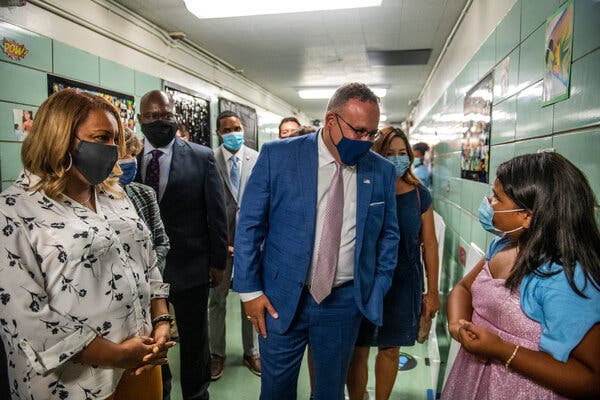
President Biden, escalating his fight with Republican governors who are blocking local school districts from requiring masks to protect against the coronavirus, said Wednesday he has directed the Education Department to intervene in states — including taking possible legal action — that have moved to bar universal masking in classrooms.
Mr. Biden said he directed Miguel Cardona, his education secretary, “to take additional steps to protect our children,” including against governors who he said are “setting a dangerous tone” in issuing executive orders banning masks mandates and have threatened to penalize school officials who defy them.
“Unfortunately, as you’ve seen throughout this pandemic, some politicians are trying to turn public safety measures — that is, children wearing masks in school — into political disputes for their own political gain,” Mr. Biden said in remarks from the East Room of the White House.
He cited a recent school board meeting in Tennessee where school officials and masks proponents, including doctors and nurses, were heckled and threatened after a debate about masking.
“We are not going to sit by as governors try to block and intimidate educators protecting our children,” he said.
The move puts the federal government at the center of bitter local debates over how to mitigate against the virus in schools, just as the highly infectious Delta variant is fueling a spike in pediatric cases. The Centers for Disease Control and Prevention recommends that everyone in schools wears masks, regardless of vaccination status, so that schools can more safely resume in-person instruction. A vast majority of counties across the United States are experiencing either “substantial” or “high” transmission rates that call for indoor mask-wearing even among the vaccinated, according to the C.D.C.
In an interview Wednesday, Dr. Cardona said he, like the president, was, “appalled that there are adults who are blind to their blindness, that there are people who are putting policies in place that are putting students and staff at risk.”
“At the end of the day,” he said, “we shouldn’t be having this conversation. What we’re dealing with now is negligence.”
Invoking the Education Department’s civil rights enforcement arm marks a major turning point in the Biden administration’s effort to get as many students back to in-person schooling this fall, and the urgency felt nationwide about blunting the impact of a pandemic has wreaked havoc on students’ educational careers since March 2020.
The nation’s most vulnerable students, namely students with disabilities, low-income students and students of color, have suffered the deepest setbacks when districts pivoted to remote learning, and their disproportionate disengagement has long drawn concern from education leaders and civil rights watchdogs.
Under Section 504 of the Rehabilitation Act of 1973, students are entitled to a free, appropriate public education, known as FAPE, and Title VI of the Civil Rights Act of 1964 prohibits discrimination based on race, color and national origin.
The department could initiate its own investigations into districts, if state policies and actions rise to potential violations of students’ civil rights. It could also review complaints from parents and advocates who make the case that prohibiting masks mandates is, in effect, a civil rights violation because it could deny a student their right to an education by putting them in harm’s way in school. Such investigations could result in resolution agreements, as many investigations by the office often do, and in the most extreme cases result in revocation of federal funding.
Dr. Cardona said conversations with parents of children with autism, respiratory illness or weak immune systems, “who rely on school for socialization and the important building blocks of learning,” had contributed to his sense of urgency.
“I’ve heard those parents, saying ‘Miguel, because of these policies, my child cannot access their school, I would be putting them in harm’s way,’” Dr. Cardona said. “And to me, that goes against a free appropriate public education. That goes against of the fundamental beliefs of educators across the country to protect their students and provide a well rounded education.”
The administration will also send letters to six states — Arizona, Iowa, Oklahoma, South Carolina, Tennessee and Utah — admonishing governors’ efforts to ban universal masking in schools.
Last week, Dr. Cardona sent similar letters to the governors of Texas and Florida, reminding them that districts had both the funding and the discretion to implement safety measures that the C.D.C. recommended for schools. The secretary also made clear that he supported district leaders who defied the governors’ orders.
In his letter to Texas, Mr. Cardona warned that the state was jeopardizing its federal relief funding. The state’s attorney general, Ken Paxton, doubled down in response, suggesting on Twitter that he would take the state’s ban on school mask mandates to the Supreme Court.
Dr. Cardona, who has been traveling around the country to promote the administration’s school reopening efforts, signaled he had lost his patience with students and desperate parents being at the mercy of partisan politics, even in places where the virus is surging.
He said that students being denied access to their right to an education as a result of unsafe school conditions was “unacceptable,” and that “if you look at the hospitalization rates, if you look at the full ICUs, it’s not working.”
“The fact that they’re not adjusting based on the illness, and the outcry from medical experts, is astonishing,” Dr. Cardona said. “But we cannot sit around. We have to do everything in our power, including civil rights investigations and even referring matters to the Department of Justice for enforcement if necessary.”
He said he has also communicated by phone with education leaders in Texas and Florida. In the conversations, he said, “we agree on vaccinations, we disagree on the use of mitigation strategies to keep students safe.”
The federal intervention comes as school districts face a monumental task of trying to get students back to in-person learning and reverse the devastating setbacks experienced by a range of students.
A report released by the department’s civil rights office this summer provided a snapshot of the suffering experienced in the year since schools abruptly shut down in March 2020.
Suzanne B. Goldberg, the acting assistant secretary of the Office for Civil Rights, warned in the June report that the challenges students faced could run afoul of civil rights laws
“Although this report provides a data-driven account of Covid-19’s disparate impacts on students, rather than a legal analysis, it is important to recognize that disparities can sometimes be evidence of legal injuries under federal civil rights laws, even when policies and practices do not directly single out a group of people for harm,” she wrote.
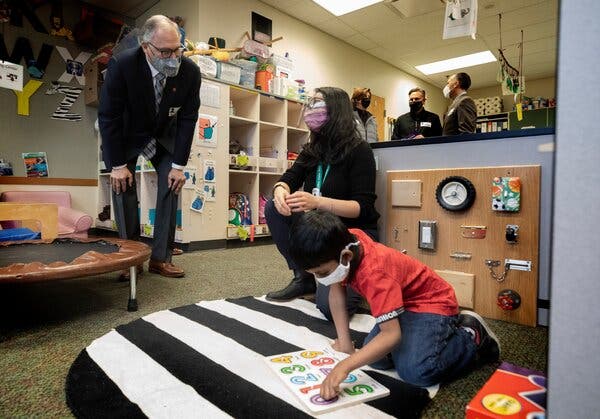
All teachers and school personnel in Washington State — including coaches, bus drivers and volunteers — will need to be fully vaccinated as a condition of employment, under a new policy announced by Gov. Jay Inslee on Wednesday. The requirement applies to staff regardless of the type of school in which they work: public, charter or private.
The policy is the strictest vaccine mandate imposed to date by any state for teachers and other staff members in schools, allowing for only a few exceptions. School staff must be vaccinated by Oct. 18 or face possible dismissal.
“We are well past the point where testing is enough to keep people safe,” Mr. Inslee said at a news conference. “We’ve tried it. It has not been adequate for the task at hand.” He stressed that 95 percent of patients hospitalized with Covid-19 in Washington were unvaccinated, and reminded the public that children under 12 are not yet eligible for vaccines.
“When you decide to get a vaccine, you’re protecting a kid out there who can’t get it,” he said.
Vaccine mandates have been hotly debated across the country, with a quarter of states, generally those led by Republicans, banning vaccine requirements for public employees like school staff, according to the Center on Reinventing Public Education. But in recent days, some Democratic officials have moved to require the shots.
Gov. Gavin Newsom of California has offered public and private school teachers the option of either vaccination or regular virus testing. City school systems in Los Angeles and Chicago have gone further to require staff vaccination, though there is an exemption process for those with disabling medical conditions or sincerely held religious beliefs.
Washington’s policy goes further than California’s. There is no option to choose regular testing instead of vaccination. There are limited exceptions, however, including for legitimate medical reasons and sincerely held religious beliefs. Individuals who refuse to get vaccinated will be subject to dismissal.
The state had already announced a mask mandate inside schools. It is experiencing a Covid-19 case surge that is straining its health care system.
Washington lagged most of the rest of the nation in reopening schools during the last academic year, as teachers’ unions across the state pushed for longer periods of remote learning, stricter virus safety measures in classrooms and access to vaccines for educators. All districts are planning for a five-day per week return to in-person learning this fall. Most districts reopen in early September.
Vaccine and mask mandates will ensure that schools can remain open, said Chris Reykdal, the state superintendent of public instruction. Extended school closures had affected children’s learning — especially the least advantaged — and put strain on working mothers, he added. When school staff get vaccinated, “You are creating the buffer and protection for young people,” Mr. Reykdal said.
On Wednesday, a spokeswoman for the Washington Education Association, the state’s largest teachers’ union, said she expected local chapters would be able to negotiate some details of the vaccine requirement. The union said in a statement that it “encourages everyone who can to get vaccinated immediately” and emphasized the continued importance of other safety measures in schools, such as masks, contact tracing, testing and social distancing.
Jennifer Matter, president of the Seattle Education Association, which is the teachers’ union in the state’s largest school district, said the union and state “have a shared interest in creating a vaccine requirement to keep our community safe.”
Ms. Matter said that her union planned to negotiate with the district on how the mandate will be implemented. The negotiations could include a process for requesting an exemption or provisions for time off to get a vaccine or recover from side effects, she said.
Leaders of the two national teachers’ unions, the National Education Association and the American Federation of Teachers, have said they support vaccine mandates for school staff.
The governor also announced new mandates for workers in the state’s colleges and universities, as well as for many child care workers. And he announced that the state’s indoor mask mandate will be expanded to include vaccinated individuals.
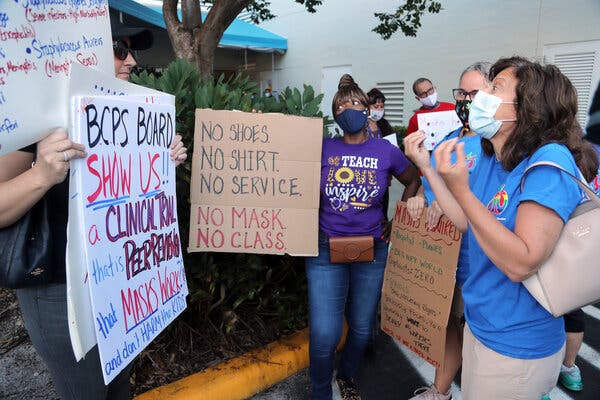
Florida’s state board of education threatened this week to penalize local school board members and superintendents of school districts in Broward and Alachua counties because they were requiring students without a medical exemption to wear masks at school.
But the threat did not head off fresh confrontations on Wednesday between the state board and Florida’s largest school district, Miami-Dade, as well as the school district in Hillsborough County, which includes Tampa. Both mandated similarly strict mask mandates in further defiance of the state.
“Yesterday I spoke with a mother of a child who died,” Alberto Carvalho, the superintendent of the Miami-Dade County Public Schools, told the state board of education on Wednesday. “Over the week, I’ve spoken with employees and their relatives, begging me to do the right thing.”
He said he would “wear proudly as a badge of honor” any consequences that may come from his recommendation to require masks, which the school board adopted with a 7-1 vote later on Wednesday.
Lubby Navarro, a board member, cast the lone dissenting vote. “I am not going to sit here and violate state law,” she said.
Battles over school mask policies have engulfed Florida as hospitals have filled with Covid-19 patients, many of them young people. In Broward County, local officials warned this week that only five beds remained available in pediatric intensive care units there.
Gov. Ron DeSantis, a Republican, ordered school districts earlier this month to allow parents to opt out of mask requirements for their children. He also allowed parents whose children feel “bullied” by mask mandates to apply for a private-school voucher.
The Hillsborough County Public Schools began its school year on Aug. 10 with parents allowed to opt out of its mask requirement. But the district quickly found so much virus in its schools that the board called a special meeting on Wednesday to consider stricter rules. They voted 5-2 to limit mask opt-outs to students with medical exemptions, in spite of a recommendation from Addison G. Davis, the superintendent, that the district keep its existing rules.
“Right now, I think it’s really important to mask our children,” said Nadia T. Combs, one of the board members. She added that she’s “not here for the adults.”
“I’m not here for politics,” she said. “I’m here to keep kids in school.”
In the last week, the district has had to quarantine or isolate 10,384 out of its more than 214,000 students — nearly 5 percent — because of virus exposure.
The emotional meeting in Tampa on Wednesday featured masked parents — some of them health care workers wearing scrubs — pleading for a stronger mandate, and unmasked parents — some of them wearing “Freedom Fighter” T-shirts — insisting on keeping the existing rules.
“My children need to be unmasked,” said Kelly Boynton, one of the opponents. “It’s tyranny.”
Before the meeting, Jennifer Buschner, who has two children in the district, said that when she first heard that mask-wearing would be optional, she felt “sick to her stomach.”
She said that her daughter, who is in second grade and has a rare genetic disorder, is enrolled in virtual school. Her daughter had hoped to return in person, but the lack of a mask mandate made it too dangerous.
“I was appalled,” Ms. Buschner said. “They took my daughter’s safety away from her, and made it so that she has to be home.”
The county school boards in Alachua (based in Gainesville) and Broward (in Fort Lauderdale) each voted to require masks, with allowances for medical exemptions signed by a physician or other health care provider. The districts argued that such a mandate complied with both state health regulations and the governor’s order.
But the state board of education disagreed. On Tuesday, in an emergency meeting held over a conference call, the board directed the state commissioner of education to investigate and punish the two districts by withholding funds, suspending or removing school board members, or withholding their salaries.
The Biden administration has offered to step in and help the districts financially or cover board members’ salaries if the state imposes those sanctions.
On Wednesday, Education Secretary Miguel Cardona said the administration would use the Department of Education’s civil rights enforcement authority to deter states from banning universal mask mandates in classrooms.
“I do believe that they’re trying to send a message,” Carlee Simon, the superintendent of the Alachua County Public Schools, said of the Florida board of education in an interview on Wednesday. “They’d like to make an example so no one else decides to try this.”
Hours after the state board of education threatened to penalize the two districts, the Alachua school board unanimously extended its mask mandate for eight more weeks.
“That’s not defying me — that’s defying the state of Florida’s laws,” Mr. DeSantis told reporters in Broward on Wednesday. “That was the Legislature of Florida that said the parents are the ones that have ultimate responsibility for health, education and welfare.”
Mr. DeSantis was promoting the opening of new centers providing monoclonal antibody treatments for people with Covid-19, part of the governor’s strategy to accept the coronavirus as an endemic threat that society needs to learn how to live with.
Vickie Cartwright, the interim superintendent of the Broward County Public Schools, said district officials agreed with the governor’s view that children need to be in brick-and-mortar schools to do their best learning, and that was why the masks are necessary, amid so much virus spread.
“We want our students back in person,” Dr. Cartwright said in an interview on Wednesday. “We want to keep them there.”
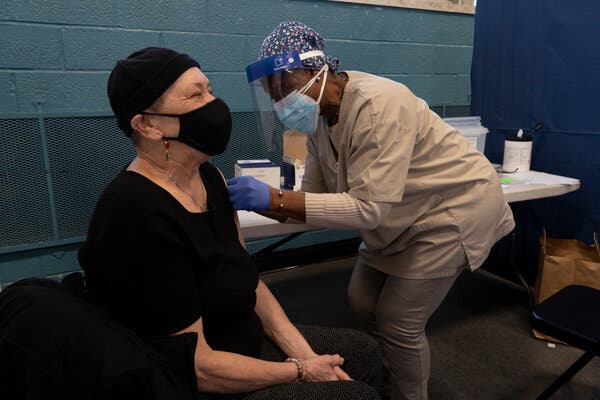
The Centers for Disease Control and Prevention released three studies on Wednesday that federal officials said provided evidence that booster shots of the Pfizer-BioNTech and Moderna coronavirus vaccines would be needed in the coming months.
But some experts said the new research did not back up the decision to recommend booster shots for all Americans.
Taken together, the studies show that although the vaccines remain highly effective against hospitalizations and deaths, the bulwark they provide against infection with the virus has weakened in the past few months.
The finding accords with early data from seven states, gathered this week by The New York Times, suggesting a rise in breakthrough infections and a smaller increase in hospitalizations among the vaccinated as the Delta variant spread in July.
The decline in effectiveness against infection may result from waning vaccine immunity, a lapse in precautions like wearing masks or the rise of the highly contagious Delta variant, experts said — or a combination of all three.
“We are concerned that this pattern of decline we are seeing will continue in the months ahead, which could lead to reduced protection against severe disease, hospitalization and death,” Dr. Vivek Murthy, the surgeon general, said at a White House news briefing on Wednesday.
Citing the data, federal health officials outlined a plan for Americans who received the two vaccines to get booster shots eight months after receiving their second doses, starting Sept. 20.
People who received the Johnson & Johnson vaccine may also require additional doses. But that vaccine was not rolled out until March 2021, and a plan to provide boosters will be made after reviewing new data expected over the next few weeks, officials said.
Some scientists were skeptical of the administration’s new initiative.
“These data support giving additional doses of vaccine to highly immunocompromised persons and nursing home residents, not to the general public,” said Dr. Céline Gounder, an infectious disease specialist at Bellevue Hospital Center and a former adviser on the pandemic to the administration.
Boosters would only be warranted if the vaccines were failing to prevent hospitalizations with Covid-19, she said.
“Feeling sick like a dog and laid up in bed, but not in the hospital with severe Covid, is not a good enough reason” for a campaign of booster shots, Dr. Gounder said. “We’ll be better protected by vaccinating the unvaccinated here and around the world.”
It’s unclear whether a third dose would help people who did not produce a robust immune response to the first two doses, said Bill Hanage, an epidemiologist at the Harvard T.H. Chan School of Public Health.
And the recommendation for boosters may also end up undermining confidence in the vaccines, he warned: “A third shot will add to skepticism among people yet to receive one dose that the vaccines help them.”
Together, the new studies indicate overall that vaccines have an effectiveness of roughly 55 percent against all infections, 80 percent against symptomatic infection, and 90 percent or higher against hospitalization, noted Ellie Murray, an epidemiologist at Boston University.
“Those numbers are actually very good,” Dr. Murray said. “The only group that these data would suggest boosters for, to me, is the immunocompromised.”
Dr. Murray said a booster shot would undoubtedly boost immunity in an individual, but the added benefit may be minimal — and obtained just as easily by wearing a mask, or avoiding indoor dining and crowded bars.
The administration’s emphasis on vaccines has undermined the importance of building other precautions into people’s lives in ways that are comfortable and sustainable, and bolstering capacity for testing, Dr. Murray and other experts said.
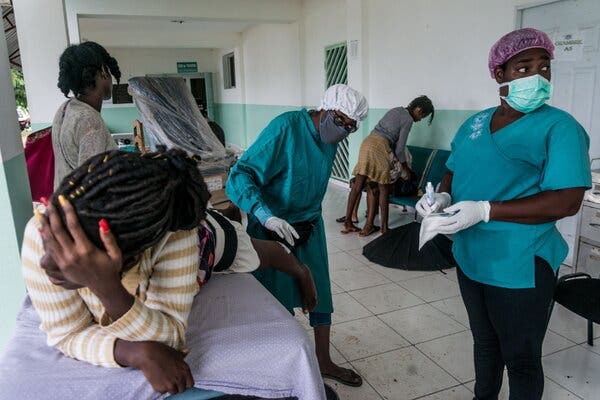
The recent deadly earthquake in southern Haiti and flash flooding from a tropical storm have set back efforts to contain the coronavirus pandemic and administer vaccines in the country, World Health Organization officials said on Wednesday.
“The earthquake aftermath combined with the Covid-19 pandemic presents a very challenging situation for the people of Haiti,” Dr. Carissa Etienne, director of the Pan American Health Organization, a part of the W.H.O., said at a news briefing.
The disasters, she said, have added another major burden to an already strained health care system in an impoverished country that has been going through a political crisis since the assassination of its president last month.
The powerful 7.2-magnitude earthquake that struck Haiti’s southern peninsula over the weekend left at least 1,941 people dead and about 9,900 more injured. Heavy rains from Tropical Storm Grace then swept the country on Monday and Tuesday, touching off flash floods and landslides. According to W.H.O., four health facilities in the country were destroyed in the disasters, and 20 more were damaged.
As overwhelmed hospitals turn their attention to disaster victims, fewer resources are available to treat Covid-19, Dr. Etienne said. It has also become more difficult to move medical supplies and personnel around the country. And it is difficult to keep the coronavirus from spreading readily in crowded emergency shelters. “With disruptive storms and hurricanes, the potential for an increase in cases is very high,” she added.
Coronavirus vaccines were slow to trickle into Haiti even before the disasters. The 500,000 doses of the Moderna vaccine that reached Haiti last month through the Covax vaccine-sharing initiative were the first significant supplies to reach the country. Only 21,000 people had received a dose by Tuesday, with health workers first in line, according to Dr. Jarbas Barbosa, the assistant director of P.A.H.O.
“We are working with the Ministry of Health to expedite the process,” Dr. Barbosa said, adding that access to vaccination was especially important in the earthquake zone where people are living in makeshift shelter.
Only about one in five people in Latin America is fully vaccinated so far, and vaccine supplies have been slow to arrive in many countries. In Caribbean and Central American nations, Dr. Barbosa said, vaccine hesitancy is emerging as a major new threat to immunization.
At the same time, new case reports have been rising sharply, Dr. Etienne said, with spikes in Jamaica, Cuba, Costa Rica, Dominica and Belize.
As hurricane season intensifies over the next few months, officials will remain “vigilant,” she said, about further strains on health care systems in vulnerable countries that could hamper efforts to reduce Covid-19 transmission.
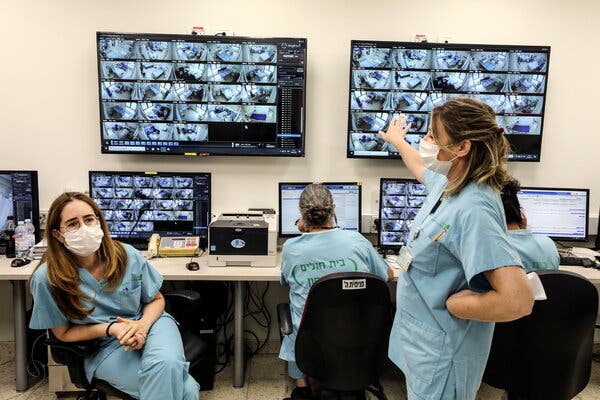
Last spring, Israel’s remarkably swift vaccination campaign was seen as a global model. Coronavirus infections plummeted, an electronic pass allowed the vaccinated to attend indoor concerts and sporting events, and distancing rules and mask mandates were eventually scrapped.
Israel offered the world a hopeful glimpse of the way out of the pandemic.
No longer.
A fourth wave of infections is rapidly approaching the levels of Israel’s worst days of the pandemic last winter. The daily rate of confirmed new virus cases has more than doubled in the last two weeks, making Israel a rising hot spot on the international charts.
Restrictions on gatherings and commercial and entertainment venues were reinstated this week, and the government is considering a new lockdown.
“I believe we are at war,” Israel’s coronavirus commissioner, Prof. Salman Zarka, told a parliamentary committee on Wednesday.
Scientists are still assessing how Israel’s pandemic response plunged from shining example to cautionary tale, and the stunning reversal has provided a crucial test for Israel’s new prime minister, Naftali Bennett, who staked a claim for leadership partly on the strength of his manifesto, “How to Beat a Pandemic.”
But some experts fear that Israel’s high rate of infections among early vaccine recipients may indicate a waning of the vaccine’s protections over time, a finding that contributed to a U.S. decision Wednesday to begin offering booster shots to Americans widely starting next month.
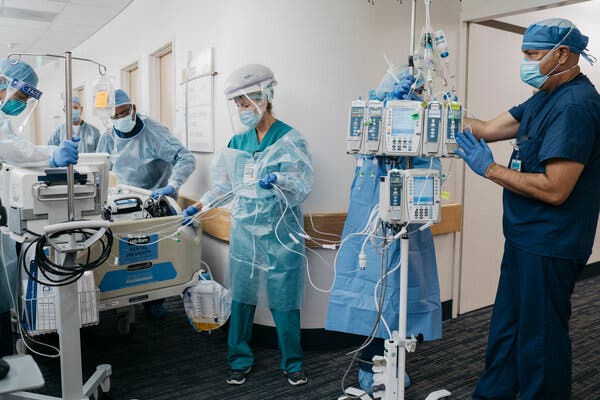
Since Americans first began rolling up their sleeves for coronavirus vaccines, health officials have said that those who are immunized are very unlikely to become infected, or to suffer serious illness or death. But preliminary data from seven states hint that the arrival of the Delta variant in July may have altered the calculus.
Breakthrough infections in vaccinated people accounted for at least one in five newly diagnosed cases in six of those states and higher percentages of total hospitalizations and deaths than had been previously observed in all of them, according to figures gathered by The New York Times.
The absolute numbers remain very low, however, and there is little doubt that the vaccines remain powerfully protective. This continues to be “a pandemic of the unvaccinated,” as federal health officials have often said.
Still, the trend marks a change in how vaccinated Americans might regard their risks.
“Remember when the early vaccine studies came out, it was like nobody gets hospitalized, nobody dies,” said Dr. Robert Wachter, chairman of the department of medicine at the University of California, San Francisco. “That clearly is not true.”
The figures lend support to the view, widely held by officials in the Biden administration, that some Americans may benefit from booster shots in the coming months. Federal officials plan to authorize additional shots as early as mid-September, although it is not clear who will receive them.
“If the chances of a breakthrough infection have gone up considerably, and I think the evidence is clear that they have, and the level of protection against severe illness is no longer as robust as it was, I think the case for boosters goes up pretty quickly,” Dr. Wachter said.
The seven states — California, Colorado, Massachusetts, Oregon, Utah, Vermont and Virginia — were examined because they are keeping the most detailed data. It is not certain that the trends in those states hold throughout the United States.
In any event, scientists have always expected that as the population of vaccinated people grows, they will be represented more frequently in tallies of the severely ill and dead.
“We don’t want to dilute the message that the vaccine is tremendously successful and protective, more so than we ever hoped initially,” said Dr. Scott Dryden-Peterson, an infectious disease physician and epidemiologist at Brigham & Women’s Hospital in Boston.
“The fact that we’re seeing breakthrough cases and breakthrough hospitalizations and deaths doesn’t diminish that it still saves many people’s lives.”
The C.D.C. declined to comment on the states’ numbers. The agency is expected to discuss breakthrough infections, hospitalizations and vaccine efficacy at a news briefing on Wednesday.
Most analyses of breakthrough infections have included figures collected through the end of June. Based on the cumulative figures, the C.D.C. and public health experts had concluded that breakthrough infections were extremely rare, and that vaccinated people were highly unlikely to become severely ill.
The states’ data do affirm that vaccinated people are far less likely to become severely ill or to die from Covid-19.
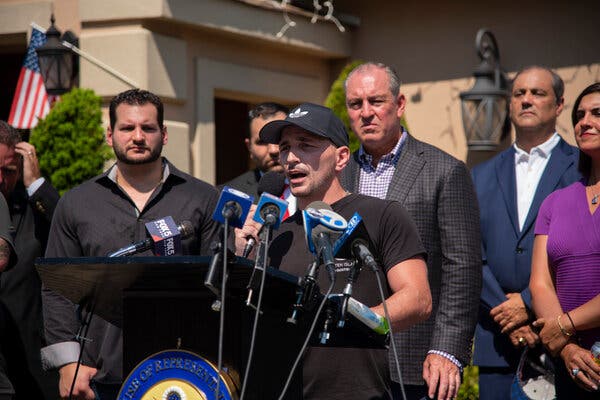
A group of small businesses is suing New York City, hoping to stop the city’s first-in-the-nation vaccine mandate for restaurants, gyms and other indoor public venues.
The lawsuit, filed on Tuesday in Richmond County Supreme Court, has the support of prominent Republican elected officials, including Representative Nicole Malliotakis and Joe Borelli, a City Council member; both represent Staten Island.
The city is requiring patrons and employees of restaurants and certain other businesses to show proof of vaccination. The plaintiffs say the city is unfairly targeting businesses that are struggling during the pandemic, and that there should be exemptions for people with certain medical conditions or religious beliefs.
Mayor Bill de Blasio has argued that the vaccine mandate and other measures are needed to curtail a troubling rise in coronavirus cases, driven in part by the more contagious Delta variant, and to encourage more New Yorkers to get vaccinated. New cases in the city have surged to an average of more than 1,700 a day, from about 250 a day in early July. About 68 percent of adult residents in the city are fully vaccinated.
The city’s vaccine mandate took effect on Tuesday, and applies to a variety of businesses.
“The executive order has rendered it impossible for anyone who chooses not to be vaccinated, for whatever reason, to work in the designated industries, wholly depriving them of their livelihood,” the lawsuit says.
Andrew Giuliani, a Republican who is running for governor, said he supported the lawsuit and that businesses should be able to set their own rules.
I applaud the Independent Restaurant Owners Association lawsuit again de Blasio’s vaccine mandates!
Every private business and their customers should choose the terms of their patronage, NOT government and certainly not the incompetent de Blasio! https://t.co/Ndh1FUDkyr
— Andrew H. Giuliani (@AndrewHGiuliani) August 18, 2021
The plaintiffs include Deluca’s Italian Restaurant in Staten Island, Pasticceria Rocco in Brooklyn and Staten Island Judo Jujitsu.
New York City’s mandate is similar to one approved in France last month that prompted large protests. Enforcement by city health officials will not start in New York until Sept. 13, the day when the city’s public schools are expected to reopen.
The lawsuit argues that the mandate unfairly applies to restaurants but not other indoor locations like hair salons, office buildings or houses of worship. Republicans also say the rules are too challenging for small businesses to enforce.
“It is beyond ridiculous that the government is mandating these already struggling small business owners to be the city’s ‘vaccine police,’” Ms. Malliotakis said in a statement.
Mr. de Blasio said on Wednesday that he was confident that his executive order would withstand a legal challenge.
“I’ve had the conversation with the Law Department — tremendous confidence that we’re in a very strong legal position,” Mr. de Blasio said. “We’re in a global pandemic still. The decisions that have been taken have been taken with the leadership of our health officials who have been fighting this battle from the beginning.”
What does the path forward for New York City look like? Democratic mayoral nominee Eric Adams, playwright Jeremy O. Harris and chef Marcus Samuelsson will join Times journalists to explore what the future holds for New York and all American cities, in our latest virtual event for subscribers.
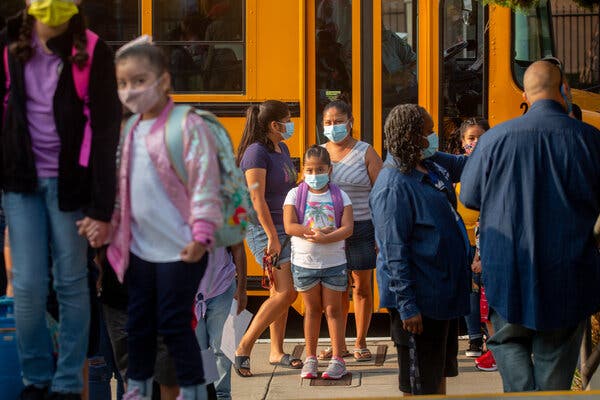
The summer is supposed to be the quietest part of the school year. But not this time.
As summer fades into fall, many of the major issues dividing the country — masks, transgender rights, critical race theory — have dropped like an anvil on U.S. schools.
Schools were already facing a crisis of historic proportions. They must reopen just as a highly contagious Delta variant of the coronavirus is tearing through communities.
And for many of the country’s 56 million schoolchildren, it has been a year of lost learning and widening inequities.
But at this critical moment, many school officials find themselves engulfed in highly partisan battles. The tense environment comes amid a growing movement to recall school board officials, over everything from teachings on race to school closures. Nationwide, there have been at least 58 recall efforts targeting more than 140 officials so far this year, more than the previous two years combined, according to Ballotpedia.
As a superintendent in Albany, Ore., Melissa Goff first noticed pushback when her district closed classrooms during the pandemic, and a slate of candidates ran for school board largely on a platform to open schools.
But by the time students returned this spring, a new flash point had emerged: Should police officers welcome students back to campus? Though it was a local tradition, some parents said that their children, sensitive after a year of Black Lives Matter protests, felt afraid.
Then, in May, Ms. Goff said, she came under fire for a plan to hold vaccine clinics at local high schools. Though she said the clinics were intended to reach families without much access to health care, Ms. Goff said that some people had seen the effort as “making kids get vaccines.”